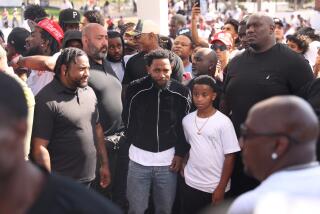Pride and Shame at the School of a Black Hero
For the last 17 years, I have been proud to have my office at UCLA in Bunche Hall, named after an African American male who, among other accomplishments, won the Nobel Peace Prize (and, to top it off, was an alumnus). But recent University of California admission figures have called my pride into question. The numbers for UCLA hit me particularly hard: Next fall there are likely to be 100 or fewer African Americans in the entering class.
Do the math. There were 225 African Americans admitted to UCLA for the upcoming year (down from 292 black students admitted in the fall of 2003). Overall, UCLA offered admission to 9,896 freshmen for the fall. This means that African Americans constituted 2.3% of the admit pool. By comparison, African Americans constitute just under 7% of California’s total population. The yield rate -- the number of those admitted who actually enroll -- for African Americans over the last several years has varied from 40% to 45%, comparable with the overall yield rate for UCLA enrollees. This means that UCLA can expect about 100 African American first-year students.
Given typical gender patterns among African American college students, this translates into about 55 women and 45 men. Consider further that roughly 25 of these students will be scholarship athletes, and the majority of these will be males. This leaves 75 non-scholarship students. Taking it one more step, there will be about 30 black male students not on an athletic scholarship, or less than 1% of the incoming freshman class.
I’m not suggesting that we stop admitting athletes (I went to college on a football scholarship). Nor am I minimizing the very real needs of other racial minorities. What I’m trying to do is shine a spotlight on an issue that has reached crisis proportions.
Is this what Californians really want? Is it fair? Is it in the best interest of the state? I’m not here to argue equations, admissions policies, test validity, demographics, the budget, cuts in outreach programs, competition from other campuses, the negative effects of the anti-affirmative action Proposition 209 and such.
I understand the analysis is complex. And I don’t care. Does the number of new African American students attending UCLA (or any UC campus for that matter) have to get to zero before we become outraged?
And where is the black leadership? When will it join the debate?
The number of black students -- and particularly black male students -- at UCLA, the UC and the nation’s colleges and universities has been in steady decline over the last several years. There are lots of obvious things that can be done to get traction on this problem -- reduce the reliance on SAT scores; remove the governor’s proposed budget cuts to outreach programs; and increase the availability and quality of college prep courses in high schools with large, minority student bodies. But all of these proposals are moot until we muster the will to put this issue on the public agenda.
Getting back to Bunche, my best friend from graduate school took a job at a large public university in the South. Some years ago, he invited me there to lecture. As we were walking across the campus, we came upon a large statue. “Who’s that?” I asked him. “Jefferson Davis,” he replied. “You know, the father of the Confederacy.”
And I said, with pride, “Well, I walk by a bust of Ralph Bunche every day when I enter my building.”
Given the recent UC admissions numbers, I wonder: How long will it be before Ralph Bunche is the last black person at UCLA?
More to Read
Sign up for Essential California
The most important California stories and recommendations in your inbox every morning.
You may occasionally receive promotional content from the Los Angeles Times.










